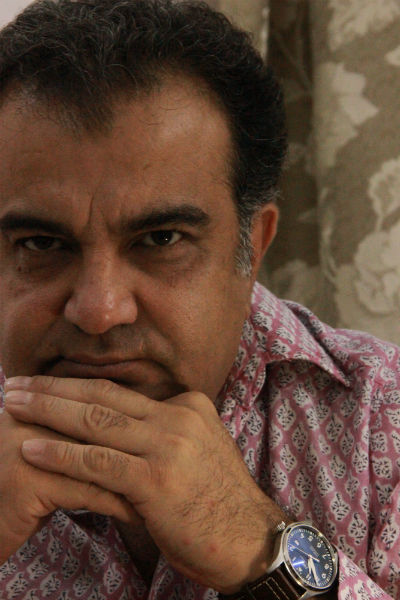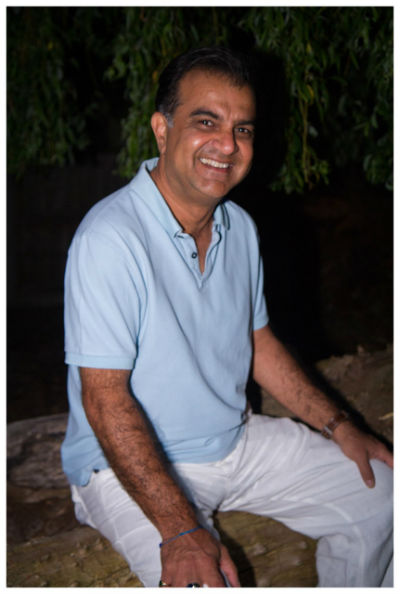Hi Friends,
Allow me to introduce Mr. Vish Dhamija, who actually is a very popular author and doesn’t need a formal introduction. He is known for writing thrillers of various sub-genre.
Reading his book(s) will remind you of watching an action movie. His exploration of the background of the places mentioned in the book is something I like specifically.

Author Vish Dhamija
From our team, I got a chance to read two of his books “Bhendi Bazaar”, and “The Mogul”. Below given are the quick links to my unbiased reviews for the same:
- Bhendi Bazaar | A Crime Thriller by Vish Dhamija | Book Reviews
- The Mogul by Vish Dhamija | Book Reviews
Impressed by his command over the language, his way of building a scene, his vocabulary, and most importantly his way of weaving the punch lines and sarcasm to the narration, we are curious to know more about him.
And, what could have been a better way to do the same if not an Author Interview? So, we approached him, and fortunately, the things worked out positively :).
So, without wasting any time, let me share the Q/A session with Mr. Vish Dhamija.
We are glad to have a conversation with you. Of course, it is not your first book, but every book is special for an author. As your book is getting both commercial success and critical acclaim gradually, can you share your feelings?
Thank you for talking to me, first of all. And you’re correct, it’s not my first book and of course, I’m happy about the launch, but let me tell you that as an author every book counts. I get the same feeling of anxiety before every launch, and I’m sure it’s the same for most of the other authors too. As a matter of fact, once you get a bit established you carry a lot more weight on your shoulders since the expectations are higher. Debut authors don’t get criticized ever. They either get the applause or they aren’t mentioned. For someone with seven books now, I can tell you with conviction that it only gets difficult with each launch.
I know what you mean, but accomplishment is a state of mind more than anything else, isn’t it? From the writing perspective I’m happy and joyous, but I’m hardly accomplished. As with everything else in life, I see every book as just another step in the journey. I’m passionate about writing and that keeps me going. Didn’t someone say “we do best those things we enjoy doing“? I am fortunate that I enjoy writing and I’ve been given the opportunity to write.
I’m a small-town boy from Ajmer in Rajasthan. I dropped out of law school to pursue marketing and since then I’ve worked in the corporate world. I have a clear philosophy in life: either be passionate about something or don’t bother at all. Hence, to that extent, you could say that my “passion” isn’t restricted to writing but extends to most aspects of my life, be it sport or a hobby or whatever… I don’t do anything half-heartedly.
There wasn’t any particular reason when I started. I had an idea of a story, which I carried inside my head for a long time (over a decade, maybe more) but never got down to putting it on paper. Then, when I started writing I quite enjoyed the process of writing itself, and the first book Nothing Lasts Forever was published in 2010. Initially, I thought that was it. Then after a brief hiatus of nearly four years I felt I should write more and wrote Bhendi Bazaar in 2014. Although Bhendi Bazar is crime fiction too, it couldn’t have been more different from my first book. From then on I think the writing-bug bit me and I’ve been writing regularly.
The idea of The Mogul came to me from a mere snippet of legal information. I took that small fact and wrote a story around it. The heart of the story revolves around the legal technicality I have explained in the author’s note in the end (It’s got the spoiler so I request readers not to read that before the book). Besides that legal twist, the story is total fiction.
In fact, the editor didn’t think what I had described in the book was possible, and so we had a call with someone in the forensic team in Haryana to clarify that what the twist in the story was possible.
Research, for me, always starts at a macro-level. For The Mogul it was the little legal technicality that I’ve mentioned before. Once I found out about that I researched extensively of how that little legality could work in a story. It was more a research in the legal journals, but I did consult a doctor too. For Bhendi Bazaar I spoke to a few police personnel who’ve worked in Mumbai—they gave me some facts; the rest was all imagined.
I sincerely have no favourites, to be honest. I couldn’t answer that one even if I wanted to. Each book, each story is so unique that it’s like the proverbial comparison of chalk and cheese.
Like they say, the whole is so much more than the sum of its parts. It’s impossible to say which part of the book was more interesting to write than the other. It’s like saying I prefer my legs to my arms or my brain to my heart, see what I mean?
I usually write in the mornings – the earlier the better.

Author Vish Dhamija
I’m more a hybrid between a method and impulsive writer. I do work out a plan, especially if it is legal fiction. I generally have the start and end of the story (the what, the how, the why) in mind before I begin, but the rest of the plot develops over time; side-stories, the twists worm into my brain as I go on building on the initial storyline.
I have a say, of course. The publishers usually ask for any ideas or visuals or existing similar covers that I have in mind, which I think would work for the story, but then it’s over to the marketing team of the publisher. I believe that once you have the experts working on something—the publisher, and their editorial, sales and marketing teams in this case, who know the market – you should let them use their expertise. I see a few choices in the end and we decide on the final cover before it goes to print.
It took me almost two years to get my first book published. It wasn’t a simple process then and it isn’t now either for a debutant, but in the end you have to be convinced that your manuscript has what it takes to sell – first to the publishing team, and then to the readers. Once, you are confident, my only advice is not to give up whatever anyone tells you. Keep at it.
Both the books you’ve mentioned have non-linear narratives. In Bhendi Bazaar, the story moves between past and present, and in The Mogul, I’ve narrated the story from perspectives of all cast members, other than the protagonist himself. Each book gives me the confidence that it’s not only about the story, but how you go about telling it. I think that makes me grow as an author, and as an individual.
Like I mentioned before, both the books you’ve picked have narratives that make the stories far more interesting, according to me. I loved penning Bhendi Bazaar, since it’s my first book with DCP Rita Ferreira as the protagonist, and since then she’s gone on to star in the second book (Doosra, released in 2016), and the third one is out next year.
I mainly read crime fiction.
Michael Connelly, James Ellroy, Lawrence Sanders, Jeffery Deaver, John Grisham, Greg Iles, Richard North Patterson, Steve Martini, … quite frankly, the list is endless.
I’m reading He Said/She Said by Erin Kelly.
Music—rock and jazz or Kishore Kumar, which I love listening to on records (LPs). Golfing. I collect vintage die-cast car models. Reading, of course. I am a classic car enthusiast too. And single malt whiskies.
I absolutely agree. Considering the number of books that are published in India (and imported), there’s every chance that your book—the one you’ve put endless hours into—could sink without as much as creating a ripple. Yes, you might have penned the best story, but how does the reader know that if the book isn’t visible? That’s where marketing comes in. How does your book stand out among the thousands on the shelf? Marketing helps. Most of my books have had a video trailer (in some way, shape or form) before the launch; then there’s social marketing.
Also, like you rightly mentioned, the cover plays an important part, and so does the blurb on the back, but for that to happen the reader must find your book first. Distribution is one of the key aspects too because books are more of an impulse buy.
Thank You
Quick Purchase Links:
- Buy Book -Bhendi Bazaar- From Amazon India – Paperback
- Buy Book -Bhendi Bazaar- From Amazon US – Paperback
- Buy Book -Bhendi Bazaar- From Amazon India – Kindle EBook
- Buy Book -Bhendi Bazaar- From Amazon US – Kindle Ebook
- Buy Book – The Mogul – From Amazon India – Paperback Edition
- Buy Book – The Mogul – From Amazon US – Paperback Edition
- Buy Book – The Mogul – From Amazon India – Kindle EBook
Over To You:
Hope you have enjoyed the Q/A session with him. And many of your questions might be already answered. Let us know that what do you think about this Interview session? Do you want us to ask anything else to him on your behalf? Do let us know. Also, let us know which other authors you like us to interview? Do let us know your thoughts and remarks via comments below. Do not forget to share this article with your friends over various social networks via Twitter, Facebook, Google Plus and others. And yes, you may like to subscribe to our RSS feeds and follow us on various Social networks to get latest updates for the site to land right in your mail box.
 ThinkerViews – Views And Reviews Personal views and reviews for books, magazines, tv serials, movies, websites, technical stuff and more.
ThinkerViews – Views And Reviews Personal views and reviews for books, magazines, tv serials, movies, websites, technical stuff and more.



